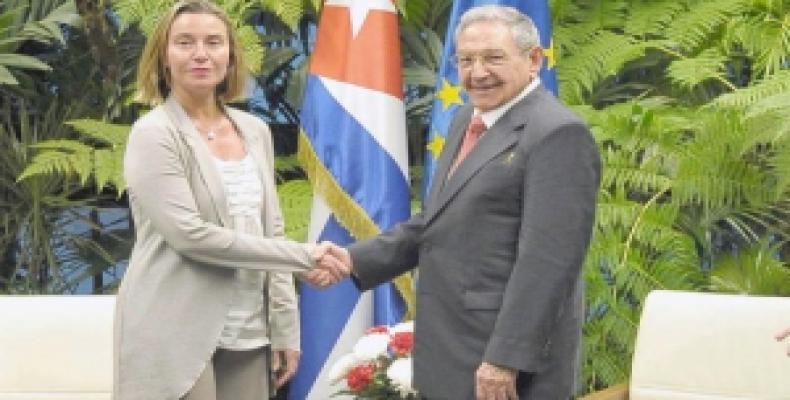Havana, January 5 (RHC)--"We have raised our relations to a new level," Federica Mogherini, the European Union´s High Representative for Foreign Affairs and Security told reporters on Thursday at the end of her third working visit to Cuba.
The EU´s top diplomat was received by Cuban President Raul Castro, highlighted Granma newspaper, which described the encounter as fraternal.
"The meeting covered the favorable state of relations between the EU and Cuba and international issues”, the paper noted.
During her 2-day visit, the first since the Agreement of Political Dialogue and Cooperation entered into force last November, Mogherini held high-level meetings with representatives of the Government and Cuban civil society.
The EU official announced that a series of agreements on renewable energy, sustainable agriculture, culture and expertise, valued at some 60 million dollars, would be signed shortly.
"The EU's support for the victims of Hurricane Irma will continue, we have already provided nine million euros" she added.
Mogherini said a delegation from the European Investment Bank would visit Cuba later this month.
In February she will preside together with Cuban Foreign Minister, Bruno Rodríguez, the first joint cooperation between the EU and Cuba to be held in Brussels.
On Thursday morning, Rodriguez and Mogherini spoke at the Cuban Foreign Ministry. The EU official assured that the Agreement is a decisive step to further develop mutual collaboration, and to find common ground in the ties between the Caribbean nation and the continent.
Rodríguez stressed the importance of the EU as a trading partner and reiterated that "we are open to the construction of a new stage in relations between the EU and Cuba”.
During her visit Mogherini repeatedly criticized the U.S. blockade on the island and said she regretted “that the current U.S. administration has apparently changed course with Cuba.”
She added that the United States and the European Union are friends. However, she noted that with her visit and the Agreement, it is obvious that “the policies and foreign affairs of the European Union are autonomous, independent and decided by its 28 member States”.


